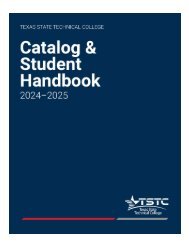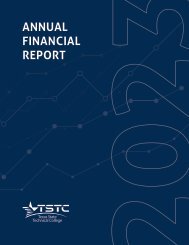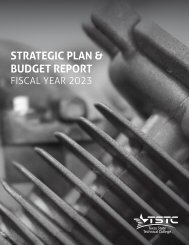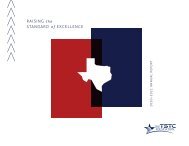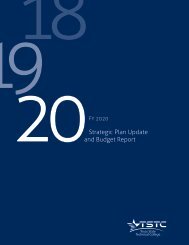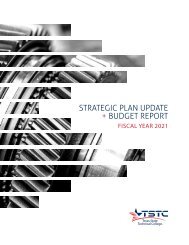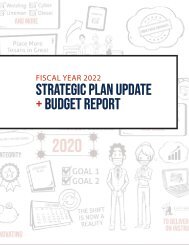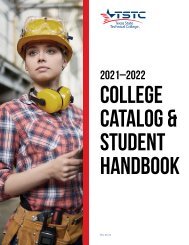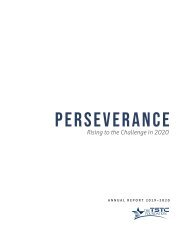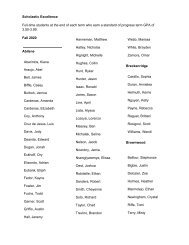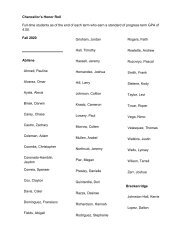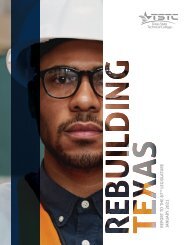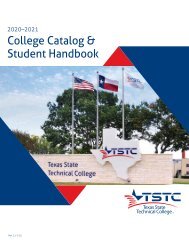Student Handbook and Catalog 2021-22 V2
Create successful ePaper yourself
Turn your PDF publications into a flip-book with our unique Google optimized e-Paper software.
Course Descriptions | 183<br />
PHYS 1301 (3-0-3) Fundamental principles of physics, using algebra<br />
<strong>and</strong> trigonometry; the principles <strong>and</strong> applications of classical<br />
mechanics <strong>and</strong> thermodynamics, including harmonic motion,<br />
mechanical waves <strong>and</strong> sound, physical systems, Newton's Laws<br />
of Motion, <strong>and</strong> gravitation <strong>and</strong> other fundamental forces; with<br />
emphasis on problem solving. Prerequisite: MATH 1314, MATH<br />
1316 or MATH 2312 or MATH 2412 (Prerequisite), PHYS 1101<br />
(Corequisite)<br />
PHYS 1302 (3-0-3) Fundamental principles of physics, using algebra<br />
<strong>and</strong> trigonometry; the principles <strong>and</strong> applications of electricity <strong>and</strong><br />
magnetism, including circuits, electrostatics, electromagnetism,<br />
waves, sound, light, optics, <strong>and</strong> modern physics topics; with<br />
emphasis on problem solving. Prerequisite: PHYS 1301, PHYS 1101<br />
or PHYS 1401 (Prerequisite), PHYS 1102 (Corequisite)<br />
PHYS 1310 (3-0-3) Conceptual level survey of topics in physics<br />
intended for liberal arts <strong>and</strong> other non-science majors. May or may<br />
not include a laboratory.<br />
PHYS 1315 (3-0-3) Course, designed for non-science majors, that<br />
surveys topics from physics, chemistry, geology, astronomy, <strong>and</strong><br />
meteorology.<br />
PHYS 1317 (3-0-3) Course, designed for non-science majors, that<br />
surveys topics from physics, chemistry, geology, astronomy, <strong>and</strong><br />
meteorology.<br />
PHYS 1401 (3-3-4) This lecture <strong>and</strong> lab course should combine all of<br />
the elements of PHYS 1301 (lecture) <strong>and</strong> PHYS 1101 (lab), including<br />
the learning outcomes listed for both courses. Prerequisite: MATH<br />
1314<br />
PHYS 1402 (3-3-4) This lecture <strong>and</strong> lab course should combine all of<br />
the elements of PHYS 1302 (lecture) <strong>and</strong> PHYS 1102 (lab), including<br />
the learning outcomes listed for both courses. Prerequisite: PHYS<br />
1401<br />
PHYS 1410 (3-3-4) Conceptual topics <strong>and</strong> algebra-level problem<br />
solving in a survey course of basic physics principles intended for<br />
non-science majors. This course includes a laboratory.<br />
PHYS 1415 (3-3-4) Course, designed for non-science majors, that<br />
surveys topics from physics, chemistry, geology, astronomy, <strong>and</strong><br />
meteorology.<br />
PHYS 1417 (3-3-4) Course, designed for non-science majors, that<br />
surveys topics from physics, chemistry, geology, astronomy, <strong>and</strong><br />
meteorology.<br />
PHYS 2125 (0-3-1) Basic laboratory experiments supporting<br />
theoretical principles presented in PHYS 2325 involving the<br />
principles <strong>and</strong> applications of classical mechanics, including<br />
harmonic motion <strong>and</strong> physical systems; experimental design, data<br />
collection <strong>and</strong> analysis, <strong>and</strong> preparation of laboratory reports.<br />
Prerequisite: PHYS 2325 (Corequisite)<br />
PHYS 2126 (0-3-1) Laboratory experiments supporting theoretical<br />
principles presented in PHYS 2326 involving the principles of<br />
electricity <strong>and</strong> magnetism, including circuits, electromagnetism,<br />
waves, sound, light, <strong>and</strong> optics; experimental design, data collection<br />
<strong>and</strong> analysis, <strong>and</strong> preparation of laboratory reports. Prerequisite:<br />
PHYS 2326 (Corequisite)<br />
PHYS 2325 (3-0-3) Fundamental principles of physics, using<br />
calculus, for science, computer science, <strong>and</strong> engineering majors;<br />
the principles <strong>and</strong> applications of classical mechanics, including<br />
harmonic motion, physical systems <strong>and</strong> thermodynamics;<br />
<strong>and</strong> emphasis on problem solving. Prerequisite: MATH 2413<br />
(Prerequisite), PHYS 2125 (Corequisite)<br />
PHYS 2326 (3-0-3) Principles of physics for science, computer<br />
science, <strong>and</strong> engineering majors, using calculus, involving the<br />
principles of electricity <strong>and</strong> magnetism, including circuits,<br />
electromagnetism, waves, sound, light, <strong>and</strong> optics. Prerequisite:<br />
PHYS 2325, MATH 2414 (Prerequisite), PHYS 2126 (Corequisite)<br />
PHYS 2425 (3-3-4) This lecture <strong>and</strong> lab course should combine all<br />
of the elements of PHYS 2325 University Physics I Lecture <strong>and</strong> PHYS<br />
2125 University Physics I Lab, including the learning outcomes<br />
listed for both courses. Prerequisite: MATH 2413<br />
PHYS 2426 (3-3-4) This lecture <strong>and</strong> lab course should combine all<br />
of the elements of 2326 University Physics II Lecture <strong>and</strong> 2126<br />
University Physics II Lab, including the learning outcomes listed for<br />
both courses. Prerequisite: PHYS 2425<br />
PSYC<br />
PSYC 1100 (1-2-1) A study of the 1) research <strong>and</strong> theory in the<br />
psychology of learning, cognition, <strong>and</strong> motivation, 2) factors that<br />
impact learning, <strong>and</strong> 3) application of learning strategies. Theoretical<br />
models of strategic learning, cognition, <strong>and</strong> motivation serve as<br />
the conceptual basis for the introduction of college-level student<br />
academic strategies. <strong>Student</strong>s use assessment instruments (e.g.,<br />
learning inventories) to help them identify their own strengths <strong>and</strong><br />
weaknesses as strategic learners. <strong>Student</strong>s are ultimately expected<br />
to integrate <strong>and</strong> apply the learning skills discussed across their own<br />
academic programs <strong>and</strong> become effective <strong>and</strong> efficient learners.<br />
<strong>Student</strong>s developing these skills should be able to continually draw<br />
from the theoretical models they have learned. (Crosslisted as EDUC<br />
1300)<br />
PSYC 2301 (3-0-3) General Psychology is a survey of the major<br />
psychological topics, theories <strong>and</strong> approaches to the scientific<br />
study of behavior <strong>and</strong> mental processes. Prerequisite: TSI Complete<br />
Reading<br />
PSYC 2314 (3-0-3) Life-Span Growth <strong>and</strong> Development is a study<br />
of social, emotional, cognitive <strong>and</strong> physical factors <strong>and</strong> influences<br />
of a developing human from conception to death. Prerequisite: TSI<br />
Complete Reading<br />
SOCI<br />
SOCI 1301 (3-0-3) The scientific study of human society, including<br />
ways in which groups, social institutions, <strong>and</strong> individuals affect<br />
each other. Causes of social stability <strong>and</strong> social change are explored<br />
through the application of various theoretical perspectives, key<br />
concepts, <strong>and</strong> related research methods of sociology. Analysis<br />
of social issues in their institutional context may include topics<br />
Texas State Technical College<br />
tstc.edu



